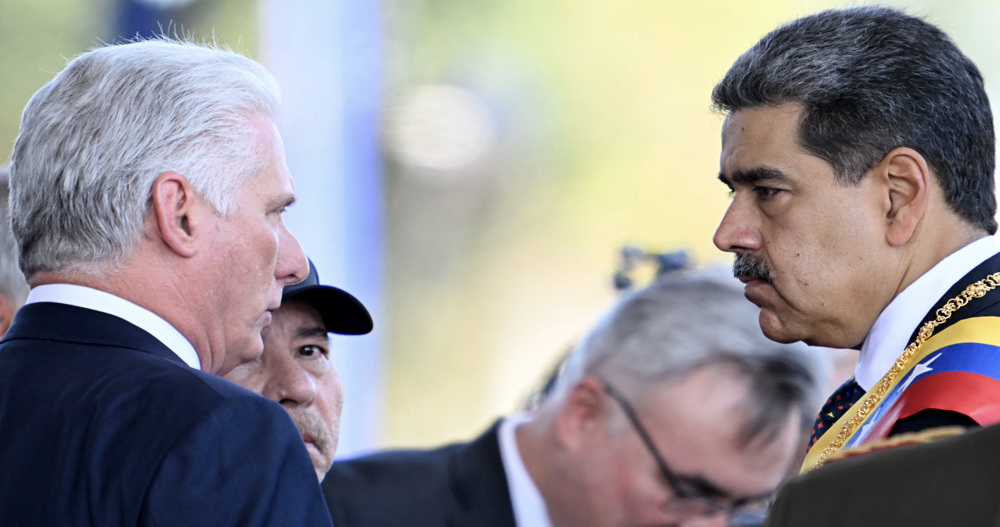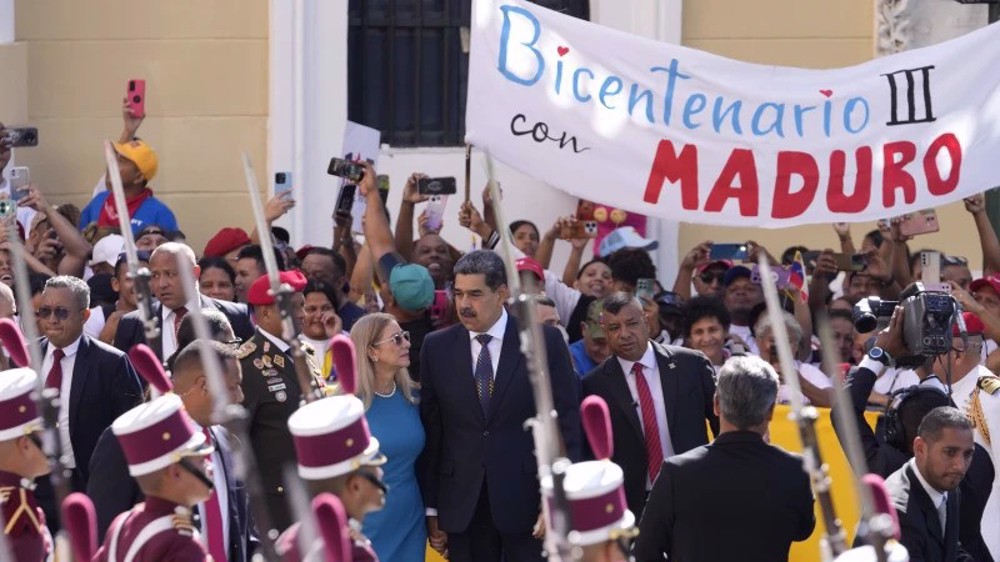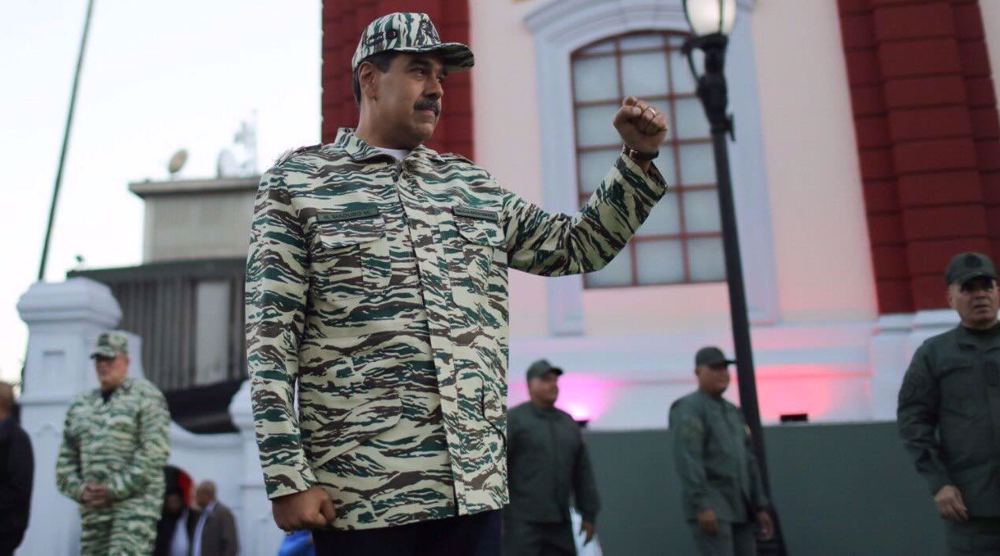Maduro’s supporters to fight for him no matter what
The supporters of Venezuelan President Nicolas Maduro say they will fight “tooth and nail” for him, amid speculation that the United States is preparing to invade the Latin American country to overthrow his government in the midst of anti-Maduro protests.
In the past couple of weeks, anti-government protests in the capital, Caracas, and other major cities have put Venezuela in political turmoil, with the opposition blaming Maduro over an ailing economy, hyperinflation, power cuts, and shortages of basic items.
Political crisis deepened in the country on January 23, when opposition figure Juan Guaido, a lawmaker who also leads the National Assembly, proclaimed himself the “interim president” of the country. United States President Donald Trump officially recognized him as such minutes later.
Washington then called on other countries to follow suit in recognizing Guaido, who had been an unknown figure until recently, stressing that Maduro’s government was illegitimate. It further placed tough sanctions against Venezuela’s state-owned oil firm PDVSA and certified the authority of Guaido to control certain assets held by the Federal Reserve Bank of New York or any other US-insured banks.
‘If the Americans set foot on Venezuelan soil...’
On Monday, Trump’s National Security Adviser John Bolton was seen at a news briefing in Washington holding a notepad that displayed the words “5,000 troops to Colombia.” That set off speculation that the US is preparing for an invasion of Venezuela, which Washington has not formerly ruled out.
Venezuela’s Ambassador to the US Jorge Valero said on Tuesday that Washington was preparing for an invasion of his country.
Maduro’s supporters, meanwhile, say they are ready to face off with America if necessary.
“We may not have high technology and experience of war like the United States, but we are a dignified people and we will defend ourselves tooth and nail,” said Marlene Vargas, a dedicated “Chavista,” who believes Trump is attempting to “strangle” Maduro’s government with sanctions and threats.
The 52-year-old teacher is part of the bedrock of support for the movement founded by Maduro’s predecessor, the late former President Hugo Chavez.
“If the Americans set foot on Venezuelan soil, we’ll face up to them,” Vargas vowed.
Maria Torrealba, 65, another pro-Maduro citizen, said, “If things heat up, we will go down on the streets.”
In 2009, the Venezuelan government created a militia force with some 1.6 million members — according to official government figures — on a declared mission to provide support for the armed forces.
Torrealba, who is a member of that militia, said she believed that the US sanctions against Caracas had plunged Venezuela into its economic crisis. “They have blocked us (market access) but we are ready to resist,” she added.
Julieta Willchez, 64, said she supported the government because she believed war would a very real prospect for Venezuelans and would devastate the country.
“That’s why we’re in the street. We are no longer defending just a president, but the country,” she said while taking part in a pro-Maduro rally. Willchez also accused the US-backed Guaido of “selling out” to Washington.
At a pro-government rally in the capital on Tuesday, Iris Varela, Maduro’s prisons minister, shouted, “War or embargo, I’m staying with Maduro.”
Separately, citizen Carmen Martinez said in a pro-government vigil, “No one can bring down President Maduro.”
The US, Canada, most Latin American, and many European countries have labeled Maduro’s second-term election win — gained last May — as fraudulent, a claim strongly rejected by Caracas.
Britain, Germany, France, and Spain have given an eight-day ultimatum to Caracas that they would also recognize Guaido as president if Maduro failed to call a new election within the given period. Caracas has already rejected that call.
Other countries, including Russia, Turkey, China, and Iran, have expressed support for the elected government in Venezuela and condemned outside interference in the country.
Despite the pressure exerted from the outside, Venezuela’s army has remained loyal to Maduro. Last week, he visited several military bases, where he lambasted the US for openly leading a coup against his administration by recognizing Guaido as “interim president.”
But the prospect of war has alarmed many, including even some of Maduro’s opponents.
On Wednesday, Guaido, in an article published in The New Times, acknowledged that he needed the army.
“The military’s withdrawal of support from Mr. Maduro is crucial to enabling a change in government,” he wrote. A “transition” of power, he said, would require “support from key military contingents.”
Guaido also said that he had had secret meetings with some members of Venezuela’s army and security forces.
He also claimed that Maduro’s reelection had been “illegitimate” and that he, as the head of the National Assembly — which is not recognized by the state — was authorized by the constitution to step in.
“My ascension as interim president is based on Article 233 of the Venezuelan Constitution, according to which, if at the outset of a new term there is no elected head of state, power is vested in the president of the National Assembly until free and transparent elections take place,” Guaido added.
Maduro was sworn in after winning an election, even though the opposition had boycotted the vote.
Guaido further said that he had commenced the process of sending ambassadors to other countries and “locating and recovering national assets tied up abroad.”
Trump calls Guaido
President Trump said on Wednesday that he had had a phone talk with Guaido “to congratulate him on his historic assumption of the presidency and reinforced strong United States support for Venezuela’s fight to regain its democracy.”
The US has a long record of sponsoring “regime change” campaigns in Venezuela and other countries. In 2002, Chavez was ousted for two days in a US-backed coup that was ultimately defeated.
Top general: Enemy dares not cast hostile glance at Iran
South Korean president skips questioning for second day after arrest
IRGC captures 15 terrorists during drills in southeast Iran
Bright prospects of Iran’s energy portfolio
VIDEO | Iran and Russia's partnership agreement
VIDEO | California wildfires leave residents struggling with insurance gaps and housing shortages
Leader: Palestinian patience, resistance forced Israel to back down
VIDEO | South African, Palestinian youths use sport to boost resistance













 This makes it easy to access the Press TV website
This makes it easy to access the Press TV website